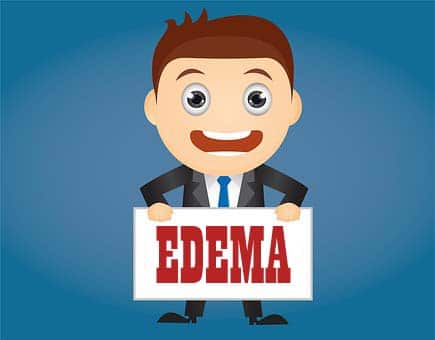What is Edema?
In ayurveda, Edema is explained as Shoth-roga. Actually, it is a symptom of
different diseases that always concerned to certain bodily organs such as
kidney, liver, heart, lung, brain disorders and so forth.
It causes anasarca (generalized oedema), feet, hands, or facial swelling (localized oedema) due to excessive fluid retention in body’s interstitial tissues that can affect any part of the body.
Tissues scarification and pain may appear in ignored cases.
It causes anasarca (generalized oedema), feet, hands, or facial swelling (localized oedema) due to excessive fluid retention in body’s interstitial tissues that can affect any part of the body.
Tissues scarification and pain may appear in ignored cases.
Usually 2 types of edema can be found, pitting edema (in this type of
condition, a tiny dimple may appear after digital pressure) and non-pitting
edema (no changes would be located after pushing with finger).
Major Causes & Risk Factors of Oedema / Water Retention
Hypertension (high blood pressure), congestive heart failure, veinous
thrombosis, congestion or insufficiency, due to blod clot.
Kidney disease / kidney failure, nephrotic syndrome.
Too much consumption of alcohol and heavy smoking.
Sedentary practice.
Lymphedema or removal of lymph nodes by surgical method.
Cirrhosis of liver.
Pregnancy, menstrual problems, menopause, hypothyroidism, burns or scalds,
brain tumor, head injury, allergy, hypoalbuminemia, sunny weather, protein
deficiency, long term fasting.
Certain medications like oral conceptive (estrogen), steroids (prednisone,
dexamithasone, betamithasone etc.) pioglitazone, ibuprofen, amlodipine etc.
Sedentary practices, or physical inactivity.
Genetic factor.
Side effect of certain medications - Contraceptive pills, cortico-steroids,
iodine, histamines etc.
Other medical conditions such as lung disease, anaemia, liver disease,
diabetes, brain tumor, thyroid problems and arthritis also lead to fluid
retention.
Excessive consumption of salt.
Too much consumption of acidic or alkaline food.
Low calorie diet, spicy, heavy, improper, vitiated and incompatible foods.
Signs and Symptoms of Edema
Swelling or water retention in face, wrists, ankles, feet and hands and
some times pains in swollen area. Dimples appears after digital pressure.
Bloated tummy or occasional abdominal pain, abdominal distention.
Joint stiffness.
Weight gain or weight fluctuations.
Nausea and / or vomiting.
Difficult eye-vision.
Occasional excessive sleep.
Weakness, tastelessness, uneasyness, sluggishness and restlessness.
Swollen eyelids when one gets up in the morning.
Coughing, coughing up blood, wheezing sound, lightheadedness, chest pain,
fainting etc. in pulmonary edema.
Numbness, roughness, red or black discoloration.
Soft, black or yellow oedematous lesions or ulceration.
Dizziness or vertigo.
Fever due to sepsis, thirst, and severe burning.
Some classical ayurvedic remedies for Edema
Amavatavidhvansa
Arogyavardhini rasa
Dhanvantara Gutika
Jatyadi ghrita
Maharasnadi Quatha
Ajmodadi churna
Mahayograj guggulu
Muktashukti bhasma
Poonarnava-Mandura
Navayash Lauha
Nimbadi Taila
Shilajit
Shirishavaleha
Other Additional tips and preventive
suggestions for Edematous patients -
Wear supportive or compressive bandage in case of ankle or feet swelling.
Walking, running, cycling or any kind of mild exercises may be beneficial
for putting off excess water, salt, and systemic toxins through sweating and
improving blood circulation.
Common salt should be decreased in foods to cure water retention.
Try to dicrease weight in case of obesity.
Thrapeutic massage of the affected part with grapefruit oil, peppermint
oil, tea tree oil, oregano oil, sesame
oil, mustard oil, juniper oil, or olive oil may be advantageous in situation of
oedematous disorder as these are anti-inflammatory and muscle relexant oils.
Elevate legs during sleeping time with the help of pillow and usually do
not sit or stand for an extended hours. Take short breaks, and, make a slight walk only to avoid feet swelling.
Limit the use of sugar, milk or other dairy products.
Potassium rich diet should be consumed as it help cure water retension.
Banana, peaches, raisins, apricot, raspberries, blackberries, strawberries,
spinach, apples, oranges, are the richest
way to obtain sufficient potassium.
Water based foods like green leafy vegetables, curry leaves, watermelon,
carrots, watercress, cucumbers, apple, snake cucumber, tomatoes, oats, artichokes, lettuce, asparagus, cabbage, brussels sprouts, grapes, lemon, beetroot should be taken.
Say no to alcoholic beverages, caffeinated drinks, tobacco chewing,
cigarrete smoking to correct water
retention.
Vitamin A, vitamin C, vitamin E, vitamin D, vitamin B-6, and B-complex,
magnesium, calcium, manganese, selenium, potassium, iron, and zinc may be helpful in body
swelling cases.
Juices of fresh fruits like apple,
cranberry, cherry, ananas, lemon, orange, grapefruit, grapes, carrots etc.
should be in taken during swelling disorder.
Always drink a great deal of normal water (no less than 8-10 glass) to
deliver maximum pee and flushing out systemic toxins to prevent and treat
edema.
Avoid potato chips, processed foods, oily foods, junk foods, packaged
foods, salty foods to prevent body swelling.
Immerse your full body or soak your
feet in a warm water mixed with epsom salt or common salt to avoid body and
feet swelling.
Do Yogasanas like Tadasana, Trikonasana, Urdhahastottasana, Bhujangasana,
Chakrasana, Parshavkonasana, Sarvangasana, Halasana, Setu bandhaasana, to
control edema.
How to treat edema with ayurvedic medicines -
There is no specific treatments available in Allopathic arrangement of
medicines, so Ayurveda should be adopted to take care of edema or body
swelling.
Some important and simple herbal remedies are described below to deal with water retention and oedema -
Some important and simple herbal remedies are described below to deal with water retention and oedema -
Gokshura - Bindii - Tribulus terrestris.
Erandamula - Castor - Ricinus communis.
Jiraka - Cumin - Cuminum cyminum
Bibhitaki / Baheda - Terminalia bellirica
Haritaki - Black myrobalan- Terminalia Chebula
Alasi - Flax Seeds - Linum
usitatissimum.
Dhaniya - Coriander Seeds - Coriandrum sativum.
Dudhi - Dandelion - Taraxacum officinale.
Parsley - Petroselinum crispum.
Punarnava - Hogweed - Boerhaavia Diffusa.
Deodar Cedar/ Himalayan Cedar - Cedrus Deodara.
Chitrak - Ceylon leadwort - Plumbago Zeylanica
Trivrit - India Jalap - Operculina turpethum.
Saunf - Fennel - Foeniculum vulgare.
Kaali Maricha - Black pepper - Piper Nigrum.
Pippali - Long pepper - Piper Longnum.
Salai / Shallaki - Boswellia serrata.
Jamaica dogwood - Florida fishpoison tree - Piscidia piscipula.
Feverfew - Bachelor's buttons -
Tanacetum parthenium.
Aloe vera - Aloe Barbadensis / Aloe
Indica.
Pyaj - Onion - Allium sepa.
Nimboo - Lemon - Citrus limon.
Shaljam - Turnips - Brassica rapa.
Ginkgo - Maidenhair tree - Ginkgo biloba.
Horse Chestnut - Aesculus hippocastanum.
Jaitun - Olive Leaf - Olea europaea.
Celery Seed - Apium graveolens.
Kheera - Cucumber - Cucumis sativus.
Coltsfoot - Coughwort - Tussilago
farfara.
Green tea - Camellia sinensis.
Comfrey / Komprey - Symphytum officinale.
________________________
Written by Rajesh Kumar
You might also like
Ayurvedic & Allopath Medicines for Typhoid (Enteric Fever)
What's the best treatment for Chikungunya? Symptoms & Prevention of Chikungunya.
Ayurvedic point of view of Dengue Fever
Gastritis - Ayurvedic herbal home remedies
What can Bulimia cause? Ayurvedic Management for binge eating disorder
_______________________















No comments:
Post a Comment